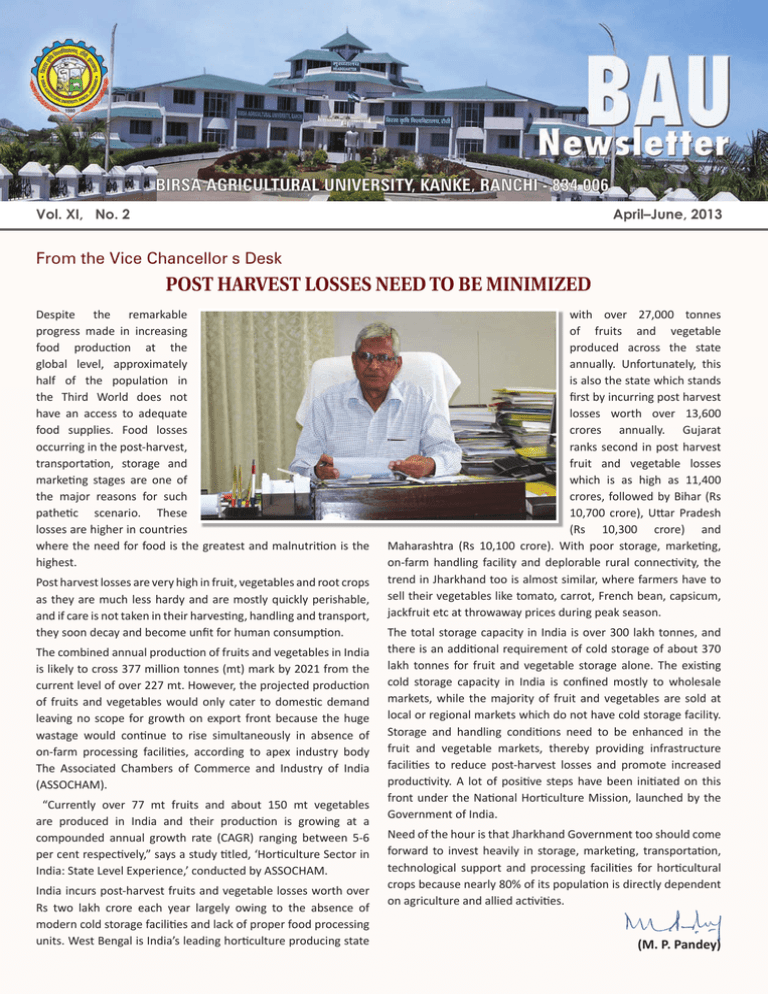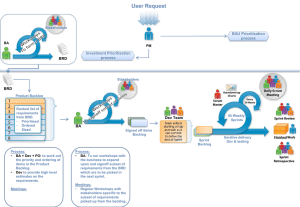POST HARVEST LOSSES NEED TO BE MINIMIZED
advertisement

Vol. XI, No. 2 April–June, 2013 From the Vice ChancellorÕ s Desk Post harvest losses need to be minimized Despite the remarkable progress made in increasing food production at the global level, approximately half of the population in the Third World does not have an access to adequate food supplies. Food losses occurring in the post-harvest, transportation, storage and marketing stages are one of the major reasons for such pathetic scenario. These losses are higher in countries where the need for food is the greatest and malnutrition is the highest. Post harvest losses are very high in fruit, vegetables and root crops as they are much less hardy and are mostly quickly perishable, and if care is not taken in their harvesting, handling and transport, they soon decay and become unfit for human consumption. The combined annual production of fruits and vegetables in India is likely to cross 377 million tonnes (mt) mark by 2021 from the current level of over 227 mt. However, the projected production of fruits and vegetables would only cater to domestic demand leaving no scope for growth on export front because the huge wastage would continue to rise simultaneously in absence of on-farm processing facilities, according to apex industry body The Associated Chambers of Commerce and Industry of India (ASSOCHAM). “Currently over 77 mt fruits and about 150 mt vegetables are produced in India and their production is growing at a compounded annual growth rate (CAGR) ranging between 5-6 per cent respectively,” says a study titled, ‘Horticulture Sector in India: State Level Experience,’ conducted by ASSOCHAM. India incurs post-harvest fruits and vegetable losses worth over Rs two lakh crore each year largely owing to the absence of modern cold storage facilities and lack of proper food processing units. West Bengal is India’s leading horticulture producing state with over 27,000 tonnes of fruits and vegetable produced across the state annually. Unfortunately, this is also the state which stands first by incurring post harvest losses worth over 13,600 crores annually. Gujarat ranks second in post harvest fruit and vegetable losses which is as high as 11,400 crores, followed by Bihar (Rs 10,700 crore), Uttar Pradesh (Rs 10,300 crore) and Maharashtra (Rs 10,100 crore). With poor storage, marketing, on-farm handling facility and deplorable rural connectivity, the trend in Jharkhand too is almost similar, where farmers have to sell their vegetables like tomato, carrot, French bean, capsicum, jackfruit etc at throwaway prices during peak season. The total storage capacity in India is over 300 lakh tonnes, and there is an additional requirement of cold storage of about 370 lakh tonnes for fruit and vegetable storage alone. The existing cold storage capacity in India is confined mostly to wholesale markets, while the majority of fruit and vegetables are sold at local or regional markets which do not have cold storage facility. Storage and handling conditions need to be enhanced in the fruit and vegetable markets, thereby providing infrastructure facilities to reduce post-harvest losses and promote increased productivity. A lot of positive steps have been initiated on this front under the National Horticulture Mission, launched by the Government of India. Need of the hour is that Jharkhand Government too should come forward to invest heavily in storage, marketing, transportation, technological support and processing facilities for horticultural crops because nearly 80% of its population is directly dependent on agriculture and allied activities. (M. P. Pandey) “lead a meaningful life, not successful life”: dr sP tiwari Renowned agricultural scientist and former Deputy Director General (Education) of ICAR, New Delhi Dr SP Tiwari urged the scientists to lead a meaningful life rather than a successful life. In this competitive world neither the strongest nor the most intelligent but only those who continue to change and respond suitably to the changing times will survive and excel in their fields, he held. Dr Tiwari, a former Vice Chancellor of Rajasthan Agricultural University, was addressing the 33rd Foundation Day of Birsa Agricultural University (BAU) as Chief Guest on June 26, 2013. In his inspirational lecture, he exhorted the scientists to dream high and set bigger goals and never feel guilty for failures rather feel guilty of putting small goals. Knowledge having trans-boundary acceptance is more powerful than military power and financial power, he added. Dr Tiwari, who is associated with several international funding agencies, urged BAU to submit an ambitious project worth over Rs 500 crores to World Bank, Asian Development Bank etc with the aim of changing the farm sector scenario of Jharkhand as the state with rich biodiversity has immense potential to contribute. Dr Nitin Madan Kulkarni, Secretary, Department of Agriculture & Cane Development said agriculture may not appear glamorous but scope of working and contributing something to the society, the nation and the world is much more in this sector Underlining the need of incorporating horticulture, animal husbandry, dairy, poultry, forestry etc into the farming system for sustainable income of farmers, Dr Kulkarni urged BAU scientists and other workers to work with dedication and commitment to make BAU the leading farm varsity of eastern India within five years. He said problems related to the recruitment of forestry graduates and shortage of teaching hands in Veterinary College would be sorted out soon. BAU Vice Chancellor Dr MP Pandey welcomed the guests and outlined the achievements of the University during last one year. He said nine (9) e-classrooms and three experiential units related to BAU NEWSLETTER April–June, 2013 2 as compared to other sectors. He said Foundation Day is not only an occasion to have an overview of achievements and identify past mistakes and weakness but also an occasion to draw future roadmap with clear cut goals. BAU, established in cool and salubrious climate of Kanke should develop itself as a tourist spot also and those passing through the highway (Ranchi-Patratu Road) should feel the fragrance of the crop varieties, flowers and aromatic plants developedrecommended-adopted by it. BAU should produce as much seed that state government does not feel the need of issuing tenders for seed supply and all the requirement of quality seed could be met by BAU. projects funded by national and International agencies, out of which 11 are running at present including STRASA-IRRI, Seed Dissemination Programme of IRRI, DBT India- IRRI QTL to Variety, Rice Fallow (NRAA) , Rice Knowledge Management Portal (RKMP), NAIP, ICAR, Gene Campaign Project funded by DST, Govt of India, District Level Contingency Planning, CRIDA, Hyderabad, Bringing Green Revolution in Eastern India (BGREI), Govt of India, AICRP on Rice, DRR, ICAR and Harvest Plus Challenge Programme funded by CIAT and IFPRI. Best Teacher Award to Dr Hem Chandra Lal Dr SP Tiwari, Ex DDG (Education), ICAR and Dr Nitin Madan Kulkarni, Secretary, Dept of Agriculture & Cane Development, GoJ inaugurate Block-II of Crop Research Centre on BAU campus bio control, medicinal plants and milk processing were set up with ICAR support. With years of efforts of scientists, nine crop varieties including four of rice and one each of soybean, groundnut, wheat, chickpea and sugarcane were developed and released by State Varietal Release Committee, Jharkhand. A total of 5837 quintal quality foundation seed of different crops were produced by BAU during 2012-13. Dr Hem Chandra Lal, Assistant Professor, Department of Plant Pathology receives Best Teacher Award from Dr Nitin Madan Kulkarni, Secretary, Dept of Agriculture & Cane Development, GoJ Dr NK Roy, Director Students Welfare and Dr Kishore Sinha, Dean Faculty of Agriculture also spoke on the occasion. Following students / non-teaching staff / farmers were awarded for their special performance: The guests also inaugurated Integrated Farming System Module and Block-II of Crop Research Centre on BAU campus and released BAU Annual Report (2012-13), BAU Newsletter and Vision Document 2030 brought out on the occasion. Best Student Award for securing highest overall grade point average (OGPA) : UG- Kumari Divya (6th semester Ag), Anshuman Kumar (2nd semester Vety), Ismat Jahan (6th semester Forestry), PG- Vivek Birua (1st semester Forestry), Dr Smita Tirkey (2nd semester Vety), Ruby Kumari (2nd semester Ag-Hort), Sumi Dutta (4th semester Biotech) Best Scientist Award to Dr DN Singh Dr DN Singh, University Professor, Department of Plant Breeding & Genetics receives Best Scientist Award from Dr SP Tiwari, Ex DDG (Education), ICAR Dr DN Singh, a Ph.D in Plant Breeding from GBPUA&T, Pantnagar joined BAU as Junior Scientist-cum-Assistant Professor in 1990, was directly recruited as Chief Scientist cum University Professor in 2005. He has to his credit about 125 research paper in different national and International journals. Dr Singh has also developed 13 varieties of rice and 1 variety of maize. He has supervised more than 25 research Best Worker Award : Class III- Nabin Chandra Mishra (Asst, Registrar Office), Yakub Gari (SO, Agriculture Faculty), Ramdhan Ram (FO, Vety Faculty), JP Kandulna (Asst, Forestry Faculty), Dharmendra Rawal (Photographer, DEE), Md Aftab Mohsin (Asst., DR). Class IV- Dharmdeo Ram (Comptroller Office), Noman Ansari (Ag Faculty), Nasir Ansari (Vety Faculty), Chandragupta Jamuda (Forestry Faculty), Mukesh Ram (DEE), Ajay Munda (DR). Best Farmer Award for innovative farming : Naresh Kisku, Gopal Gope, Nirmal Yadav, Subodh Chaudhary, Shravan Kumar Gupta. Essay Competition for students on the topic ‘Has corruption become part and parcel of Indian Politics?’ : Ist- Abhishek Pradeep, 2nd- Suryanshu Yadav, 3rd- Abhay Kumar (all from Agriculture Faculty). Essay Competition for non-teaching employees on the topic ‘Winners never quit and quitters never win’. 1st- Sangeeta Vijaya (VC Cell), 2ndAlok Kr Jha (VC Cell), 3rd- Md Shamshul Haque (Ag Faculty). (Pankaj Vatsal) BAU NEWSLETTER April–June, 2013 3 XXvi eXtension education council meeting ICAR and external expert said that teaching, research, training and extension were four pillars of agricultural development. He stressed that skill-oriented programme should be conducted from time to time for rural youth. Citing the example of AMUL, Gujarat, he said that it was the best model of extension and KVKs should follow it and organize the farmers in same way. Dr. M.P. Pandey, Vice Vhancellor, BAU said extension system was the centre of focus for agricultural development. Underlining the importance of secondary agriculture, he said it would be helpful to rural youth in generating additional income and employment. He was addressing the XXVI Extension Education Council Meeting of BAU at Krishak Bhawan on 17.06.2013. He also emphasized on involvement of PRIs in planning, implementation and monitoring of extension programmes. Efforts should be made to promote livestock in integrated farming systems and the rice-fallow area should be covered with second crop to bring that area into double cropping, the VC stressed. In his remarks as external expert, Dr. R.P. Singh, former Vice-chancellor, MPUAT, Udaipur, Rajasthan said the basic concept of extension had been lost in confusion and bureaucracy prevailing among the scientists. They should work with the people at grass root level. He emphasized that profitability should be the focal point of any agricultural extension programme and the University should work on the technology to reduce the cost of critical inputs. Dr. C. Prasad, former Deputy Director General (Agril Extension), Dr. A.K. Singh, Zonal Project Director, Zone-II, ICAR, Kolkata expressed concerns over the vacant positions in the KVKs and requested the University to return back the services of KVK personnel who were either on lien or on deputation elsewhere or on study leave. He suggested that the KVKs should equip themselves with good documentation skills. For improving the state of dissemination of technologies, he cited the example of KVKs of West Bengal for broadcasting Kisan Chaupal for farming communities every Saturday. Dr DK Singh ‘Dron’, Addl Director Research outlined the technologies released by the University and emphasized on its dissemination. Highlighting the important extension achievements of the University during the year 2012-13, Dr RP Singh ‘Ratan’, Director Extension Education reported that altogether 60908 farmers/ entrepreneurs received advisory services. Training unit of DEE organized 38 training courses for 1278 farmers and extension functionaries and altogether 145 onfarm trails and 5192 component/package demonstrations conducted in an area of 1209 ha. Dr. Alok Kr Pandey, Director, Dairy Development, Govt. of Jharkhand, Dr. Prabhakar Singh, State Mission Director, National Horticulture Mission and Shri R.P. Singh, Director SIRD, Ranchi also expressed their views on the occasion. At the end vote of thanks was extended by Dr. (Ms) Niva Bara, Head, Dept of, Agril. Extension, BAU. (Valeria Lakra) seminars/ symPosia/ workshoPs/ training Programmes attended 1. Dr DK Shahi, Chairman (SSAC) attended 7th Research Advisory Committee Meeting of National Research Centre for Litchi (ICAR) at Muzaffarpur, Bihar on 24th April, 2013. 2. Dr BK Agarwal, Assoc Prof (SSAC) attended One day workshop-cum-discussion Seminar on “Preparation of SRS under NeGP-A programme” and gave valuable input for the improvement of SRS. 3. Dr DK Shahi, Chairman (SSAC) attended Council Meeting of ISSS, New Delhi during 7-8 June, 2013 at IARI, New Delhi. 4. Dr BK Agarwal, Assoc Prof (SSAC) attended state level meeting on NeGP-A Empowered Committee at 4 BAU NEWSLETTER April–June, 2013 Project Building, Ranchi on 12th June, 2013 under the Chairmanship of Secretary, Information Technology, Govt. of Jharkhand. 5. Dr Rishipal Singh, Principal Investigator and Shri Siddharth Jaiswal, Chief Operating Officer (COO), BPD Unit, BAU attended the Annual Conference of Network of Indian Agribusiness Incubator (NIABI) organized by NAIP from 25– 27 April, 2013 at NASC Complex, New Delhi. 6. Shri Siddharth Jaiswal, Chief Operating Officer BPD Unit, BAU attended the conference on ‘Development Marketplace 2013’ organised by World Bank at IIFM, Bhopal on 1st May, 2013. bau-bred croP varieties to bring green revolution in Jharkhand The Jharkhand State Seed Sub Committee, notified in April, 2013 by the Government of India after about a decade, has released nine (9) highBIRSA VIKAS SUGANDH-1 yielding varieties of rice, groundnut, soybean, sugarcane and chickpea crops which are resistant towards major diseases and pests. The release proposal was approved at a meeting of the committee chaired by Shri Arun Kumar Singh, Principal Secretary, Dept of Agriculture & Cane Development, GoJ on May 6, 2013. yields 20-25 qtl/ ha. It is suitable for direct seeding in uplands under rainfed conditions of Jharkhand. Its grains are long slender and the variety is resistant BIRSA VIKAS DHAN-111 to blast and brown spot diseases and gandhi bug and stem borer pests. Lalat rice variety, originally developed by Orissa University of Agriculture and Technology, Bhubaneshwar and released and notified for Orissa State was released for Jharkhand also owing to its suitability to soils and climate of this state. This long-grain verity yields 40-45 qlt/ha and matures in 115-120 days. BAU Vice-Chancellor Dr M P Pandey, a member of the committee informed that all these varieties will Birsa Safed Soybean-2 having yield potential of be notified by Central Seed Committee 25 qtl/ha matures in 105-107 days. This verity of Government of India for planned has 40% protein and 17% oil content. multiplication during coming seasons to In wheat, Birsa Gahun-3 matures in ensure that these varieties reach the 110-115 days and yields 25-40 qtl/ farmers at the soonest and they take ha. It is suitable for rainfed and benefits of enhanced productivity limited irrigation conditions. Variety and income by its cultivation. It will is resistant to rust and leaf blight pave way for second green revolution diseases. in the state, the VC added. Among the released nine crop varieties, Birsa Groundnut-4 has the highest four are of rice alone. Of these, Birsa oil content (51%) among groundnut Vikash Sugandh-1 matures in 120-125 varieties in the country developed so far BIRSA SAFED SOYBEAN-2 days and is suitable for cultivation under and is resistant to tikka disease. With yield rainfed conditions of Jharkhand. It is variety potential of 20-22 qlt/ha, this variety matures with scented grain and yield potential of 40-45 in 115-120 days. Being bold-seeded, it is most suitable quintal/ ha and moderately resistant to brown spot and for confectionary use and export. blast diseases and gundhi bug pest. The released variety of important and commercial crop Birsa Vikash Dhan-203, developed by hybridization in the State, Sugar cane, BO-147 has maturity period of between IR-36 and Kalinga-3 varieties, matures in 115-125 about one year and its plant height goes up to 3 meters. days. The variety with long slender grains and 40-45 qtl/ha This variety is disease-free and yields 700-800 qtl/ha with yield potential is moderately resistant to blast, bacterial leaf sucrose content of 16 %. blight and brown spot diseases Birsa Chickpea-3 matures in 118-120 days and yields 10-20 and stem borer qtl/ha. It is a wilt resistant and drought tolerant variety with and gandhi bug protein content of 20-21 per cent. pest Those who attended the meeting included BAU scientists Birsa Vikash Drs Rishi Pal Singh, D K Singh ‘Dron’, D N Singh, Director Dhan-111 is Horticulture Dr Prabhakar Singh, Joint Secretary Agriculture an extra early Ram Prasad Say, HARP scientist Dr Bal Krishn Jha and maturing variety CRURRS scientist Dr V D Shukla. (80-95 days) and (DN Singh) BIRSA VIKAS DHAN-203 BAU NEWSLETTER April–June, 2013 5 inauguration of rainout shelter facility Rainout Shelter Facility was inaugurated at Birsa Agricultural University by Dr SK Sharma, Vice Chancellor, SKHPKV, Palampur on 30th May, 2013 in presence of Dr. M P Pandey Vice Chancellor, BAU and all Deans, Directors of the University and scientists of Agriculture Faculty. Drought is a major constraint in increasing the production and productivity of crops in general and rice in particular. This facility would help in developing drought tolerant varieties of rice, maize, pulses and oilseeds not only during Kharif but also in Rabi season. The screening for drought will be carried out both at vegetative and terminal (reproductive) stages for identification of genotypes tolerant to drought. BAU Vice Chancellor Dr MP Pandey urged the scientist of the University for better utilization of this facility for development of drought tolerant varieties of different crops. Research work has already been started during 2013-14 for identification of drought tolerant genotypes of rice, maize etc. (DN Singh) review meeting of dst funded ProJects Review meeting of three projects Rice Fallow, Gene Campaign and Aquaculture running at BAU with the financial support of Ministry of Science and Technology, Govt. of India was held on 30-31 May, 2013. It was organized under the Chairmanship of Dr SK Sharma, Vice Chancellor, SKHPKV Palampur. The review committee was fully satisfied with the presentations made by individual scientists of all the three projects. It was attended by Dr Malavika Dadlani, Joint Director Research, IARI, New Delhi, Prof SK Khare, IIT, New Delhi, Dr Rajeshswari Raina, BAU NEWSLETTER April–June, 2013 6 NISTADS, New Delhi, Dr. Sunil Kumar Agrawal, Scientist, DST, Dr Suman Sahay, Chairperson, Gene Campaign, Dr Mamta Sharma, Senior Scientist, ICRISAT, Dr DN Singh, Chief Scientist, Dr AK Singh, Chief Scientist and Dr CS Mahto, Junior Scientist. The committee experts made some suggestions which were duly incorporated by concerned scientist while in the research trials during 2013-14. The final report will be submitted after data analysis. (DN Singh) bihar agriculture minister visits bau Sri Narendra Singh, Minister of Agriculture, Govt. of Bihar visited BAU on 20th May, 2013. Addressing the scientists and senior officials of the University in the Board Room, he stressed on the development of hybrid crop varieties by public sector institutions because private seed companies were charging very high rates for the hybrid seeds. The Minister requested BAU to provide improved seeds of ragi and groundnut to Bihar which could be taken as alternative crop in the face of scanty rains or drought like situations. He also enquired about the water management techniques being utilized in the plateau region of Jharkhand which could be replicated in similar regions of Bihar to benefit the farmers. Er DK Russia, Head, Department of Agricultural Engineering, BAU explained the water harvesting, management and recycling techniques suitable for the region. The Minister also visited Agricultural Technology Information Centre (ATIC) and Central Museum of BAU to have a firsthand knowledge of the activities and achievements of the University. Senior BAU officials Drs Kishore Sinha, RL Prasad, RP Singh ‘Ratan’, SK Pal, Rishipal Singh and Narendra Kudada were present on the occasion. (Pankaj Vatsal) training workshoP on nutrient for maize and wheat Dept of Soil Science & Agricultural Chemistry, BAU, Ranchi, International Plant Nutrition Institute (IPNI) and International Maize & Wheat Improvement Centre (CIMMYT) jointly organized One-day Training Workshop on “Nutrient Expert : A Fertilizer Decision Support Tool for Maize and Wheat” on 18th June, 2013 at BAU Krishak Bhawan. While inaugurating the event, Chief Guest and ViceChancellor, BAU, Dr MP Pandey stressed on making agriculture profitable for farmers and ensuring food security to all countrymen. Dr Pandey said the new generation is turning its back on agriculture due to account of nonprofitability. It has now become a cause of grave concern for scientists and agriculture policymakers. The Nutrient Expert tool developed by a group of scientists involved in IPNI project was very useful and beneficial for better nutrient recommendation of Maize & Wheat Crop to the farmers. Dr Adrian M Johnston, Vice-President, IPNI, Dr T Satyanarayana, and Dr Sudarshan Dutta, both Dy Directors, IPNI gave lectures on Nutrient Expert: A New Approach to SSNM. Dr Rakesh Kumar, I/C IPNI & CIMMYT Project, Ranchi gave an overview of Nutrient Expert Trials conducted at Ranchi and Sahebganj districts of Jharkhand. Dr DK Singh ‘Dron’, ADR, BAU welcomed the guests & participants and Dr RP Singh ‘Ratan’, DDE, BAU proposed the Vote of thanks. Altogether, 85 participants from State Govt, NGOs, IFFCO and scientists of different departments participated in the programme. (Rakesh Kumar) BAU NEWSLETTER April–June, 2013 7 nss advisory committee meeting The NSS Advisory Committee meeting of BAU was held on 10th April, 2013 under the chairmanship of Vice Chancellor , Dr MP Pandey. The meeting was attended by Deans, Directors of BAU, faculty members, Programme Officers, representative of UNICEF Jharkhand, Social workers, Regional Head, NSS, Patna, State Liaison officer, NSS and progressive farmers. Meeting started with welcome address by Dr. P.K.Singh, Programmme Coordinator, NSS. Dr MP Pandey, Vice Chancellor in his opening remarks said that overall aim of National Service Scheme was to give an extension dimension to the higher education system and orient the student towards community service, while they are studying in educational institutions. The interaction of students with common villagers/farmers will expose them to the realities of life and bring about a change in their social perception, he added. Dr PK Singh, Programme coordinator presented the achievements (2012-13) and programme activities to be under taken during 2113-14. (PK Singh) Polythene removal camPaign on world environment day On the eve of World Environment Day (5th June 2013), the NSS cadets of Ranchi Agriculture College launched polythene removal campaign in Ranchi unmder the leadership of Dr Naiyar Ali, Programme Officer, NSS. They removed polythene from Albert Ekka Chowk to Daily market at Main Road, Ranchi. The Cadets also created awareness among the civil society, shopkeepers, vendors and people of Ranchi about the ill effects of polythene use which was damaging our environment. The Ranchi Deputy Commissioner, Sri Binay Kumar Choubey and SSP, Ranchi Sri Saket Kumar Singh also took part in the campaign against polythene and appreciated the effort of NSS cadets. Officials of Ranchi Municipal Corporation, members of Jharkhand Chamber of Commerce and Dr. P.K. Singh, Programme Coordinator, NSS, BAU were present on the occasion and encouraged the students. world veterinary day at ranchi veterinary college World Veterinary Day was celebrated at Ranchi Veterinary College, a constituent Unit of BAU, on 27.04.2013. Dr AG Bandhyopadhyay, Director, Department of Animal Husbandry, Govt of Jharkhand and Dr Anirudh Prasad, Retd Professor of Veterinary Physiology were chief guests of the event. Thirty two students and 20 staff of the College donated blood at the Blood Donation Camp organised on the occasion. Mr Rajanikant, a 9th semester students emerged winner at the debate competition organised on the theme ‘Vaccination constraints and remedial measures.’ At the poster presentation contest, Ms Anjali Kumari (9th semester), Kusum Lata (7th semester) and Lalita Kumari (PG Medicine) were adjudged 1st, 2nd and 3rd, respectively. (Suresh Mehta) BAU NEWSLETTER April–June, 2013 8 (PK Singh) XXXiii kharif research council meeting The 33rd Kharif Research Council Meeting of BAU was held on 13-14 June, 2013 in Ranchi Agricultural College Auditorium. Prof SK Sanyal, Former Vice Chancellor, Bidhan Chandra Krishi Vishwavidhyalaya, Mohanpur (WB) and Dr Umesh Kumar Mishra, Vice Chancellor, Chhattisgarh Kamdhenu Vishwavidhyalaya, Durg were experts on this occasion. BAU Vice Chancellor Dr MP Pandey, who chaired the meeting, praised scientists for their sincere efforts and better outcomes in terms of release of nine varieties of six crops after a gap of 10 years. He stressed on improving production and productivity of different crops by exploiting available natural resources, application of classical and molecular approach and remodelling of agronomical packages with suitable plant protection measures. The VC said germplasm screening for moisture stress, acid soils and heat tolerance should be priority area of research and hybridization programme for different field crops as well as vegetable should be taken up in a big way. Dr Umesh Kumar Mishra, Vice Chancellor, Chhattisgarh Kamdhenu Vishwavidhyalaya, Durg said since a large number of farmers were small, marginal and landless, integration of field and horticultural crops with animal husbandry should be the right choice for their better livelihood, employment and income generation. Efforts should be made to establish nucleus herds of important Indian breeds of cattle, buffaloes and other animals for producing quality breedable males for improvement of poor productive livestock in Jharkhand, he added. He also stressed on undertaking basic research particularly in Biochemistry, Physiology, Nutrition and Anatomy departments. Prof SK Sanyal, former Vice Chancellor, Bidhan Chandra Krishi Vishwavidhyalaya, Mohanpur (WB) said issues concerning the tribals and other weaker sections of the society dependant on agriculture and allied sectors for their livelihood should be addressed through location specific research and low-cost effective technologies. Underlining the importance of taking into account the environmental issues while formulating research programmes, he said level of Arsenic in meat and organs depends on loading of arsenic in feeds / fodder, therefore, feed, fodder, soil and water should also be analyzed. Dr RP Singh ‘Ratan’, Director Extension Education, BAU stressed that scientists should have close coordination with extension functionaries particularly KVKs to get feedback before finalizing research programme. Research programmes should be in context of Natural Resource Exploitation and climate change, he added. Dr DK Singh ‘Dron’, Additional Director Research presented “An Overview of Research Achievements” with research highlights of Kharif Research programmes of 2012-13. He highlighted the area of ongoing research programmes at university main campus, Ranchi and at three Zonal Research Stations along with agricultural scenario in Jharkhand, major constraints for agricultural development in the state and researchable issues to make the state self sufficient in cereal, oilseeds, pulses, fruits, vegetables, milk, fish, meat and egg. (DK Singh ‘Dron’) BAU NEWSLETTER April–June, 2013 9 Sancharak” at Allahabad from 26.04.2013 to 29.04.2013. • May 2013 • Attended 18th Meeting of the Organisation & Management Programme Committee (O&MPC) of NAIP as a member of the prestigious body under ICAR, New Delhi from 02.05.2013 to 03.05.2013 April, 2013 • Attended Consortia Advisory Committee Meeting of NAIP Project at BAU Campus on 01.04.2013 • Attended meeting with Chief Secretary, Govt. of Jharkhand at Project Building, Ranchi on 09.04.2013 • Attended as a member, the first meeting of New Executive Committee of IAUA for 2013 at New Delhi and participated in 48th Annual Rice Group Meeting and chaired the special session on “Pre Breeding in Rice to improve yield resistance and quality” at SKUAS&T, Srinagar from 10.04.2013 to 17.04.2013. • Attended meeting with Advisor to His Excellency the Governor of Jharkhand in his office chamber on 25.04.2013 • Attended Centenary Celebration organized by Vigyan Parishad, Prayag, Allahabad to receive the felicitation award as “Vigyan June 2013 • Attended National Seminar on Animal Nutrition and Fodder Security as Chairperson of Technical Session IV on 02.06.2013. The event was organized by the Directorate of Dairy Development, Government of Jharkhand at Hotel Holiday Home, Kanke Road. • Attended 20th Annual General Body Meeting and Foundation Day programme of National Academy of Agricultural Sciences (NAAS), New Delhi on 03.06.2013 to 06.06.2013 • Attended Expert Consultation Meeting of Indian Institute of Agriculture Biotechnology (IIAB), Ranchi and National Institute of Biotic Stresses Management (NIBM), Raipur at ICAR, New Delhi BAU NEWSLETTER April–June, 2013 10 • Attended National Seminar on “Climate Resilient Rice Production under Rainfed Ecosystem” as an Invited Key Speaker for the Lead Paper at Dr Balasahab Sawant Krishi Vidyapeeth, Shirgaon, Ratnagiri, Maharashta from 18.05.2013 to 21.05.2013 • • • • • • • • • from 09.06.2013 to 12.06.2013 Chaired the 33rd Kharif Research Council Meeting of BAU, Ranchi on 13-14, June, 2013. Chaired the Annual Group Meeting of AICRP on Pigeonpea at BAU, Ranchi on 15.06.2013 Chaired the XXVIth Extension Education Council Meeting of BAU, Ranchi on 17.06.2013 Chaired the Xth Seed Council meeting of BAU, Ranchi on 17.06.2013. Chaired the Technical Session in International Plant Nutrition Institute (IPNI) Workshop at BAU, Ranchi on 18.06.2013 Attended Statutory Selection Committee Meeting as an Expert Member (Chancellor’s Nominee) of the Selection Committee for recruitment to the post of Dean, College of Agriculture at Orissa University of Agriculture & Technology (OUAT), Bhubaneswar, Odisha from 20.06.2013 to 22.06.2013 Attended 33rd Foundation Day Ceremony of BAU on 26.06.2013 Attended 45th Managing Committee Meeting of RINPAS, Kanke, Ranchi on 26.06.2013 Chaired the 76th Meeting of Academic Council Meeting of BAU, Ranchi on 28.06.2013 Chaired the Vetting Workshop of District Level Contingency Plan at BAU, Ranchi on 29.06.2013. annual grouP meet on PigeonPea (late duration) at bau Annual Group Meet on Pigeonpea (late duration) was held at BAU, Ranchi on 15th June,2013. Vice-Chancellor Dr MP Pandey, who graced the occasion as Chief Guest, emphasized the need to develop early and medium duration pigeonpea varieties/ hybrids suitable for rainfed and acid soils of Jharkhand. Dr SK Sanyal, Ex Vice-Chancellor, BCKV, West Bengal and renowned soil scientist was the Guest of Honour. He urged the pigeonpea scientists to develop suitable varieties for NEPZ. Dr N Nadarajan, Director, IIPR, Kanpur stressed on focussing attention for development of varieties for late duration. He advised the NEPZ Breeders to include land races, wild and related varieties in hybridization programme to widenthe genetic base. training on biofertilizer world environment day Twenty scientists from different Agricultural Universities of NEPZ attended the meet. The technical programmes of the coming Kharif season were finalized for different centres. Dr.Z.A.Haider, Chairman, Dept of PBG highlighted the role of short duration varieties which could fit in the cropping system of Jharkhand. Dr Niraj Kumar proposed a vote of thanks. (Niraj Kumar) Department of Soil Science & Agril Chemistry organized 3-day training programme on “Use of biofertilizer & their production and production of value added enriched vermicompost” from 19-21 April, 2013 at Faculty of Agriculture for Tribal Farmers of Gumla district. The programme was sponsored by ATMA, Gumla. Dr DK Shahi and Dr NC Gupta delivered lectures on the theory and practical aspects of biofertilizer & value added organic manure. Altogether, 25 tribal farmers of Gumla district participated in this programme. Dr Rakesh Kumar, I/C Training coordinated the programme. soil testing services During April to June 2013, altogether 1064 soil samples were received from farmers of Ranchi, Gumla, Khunti, East Singhbhum, West Singhbhum, Bokaro, Simdega and Giridih districts. These soil samples were analyzed for soil pH, Organic carbon, available N, P, K and their recommendation on soil health card were sent to concerned farmers. workshoP on organic farming The Business Planning and Development (BPD) Unit of BAU organized a workshop on ‘Cluster development in Organic Farming’ at Loksevaytan, village-block Nimdih under Saraikela Kharsawan district 29-30 June, 2013. Seventy seven farmers participated in the workshop and gained knowledge about organic farming and its advantages, different methods of preparation of organic fertilizers and pesticides and practical demonstration. Technical material was supplied to all the participants. Shri Siddharth Jaiswal, Chief Operating Officer, BPD Unit, BAU, local officials of Horticulture Department and organic farmers delivered lectures during the event. (Siddharth Jaiswal) On the occasion of World Environment Day (5th June, 2013), a debate competition was organised on “Conservation of Natural Resourses for Better Life” for the students of Forestry Faculty. As the chief guest of this function, Dr SN Pandey, Former Vice Chancellor of BAU distributed prizes among the students for their best speech and presentation. Dr MH Siddiqui, Dean, Faculty of Forestry dwelt at length on the theme for this year’s World Environment Day celebrations- Think, Eat and Save. It is an anti foodwaste and food-loss campaign that encourages reducing food wastage. According to the UN Food and Agriculture Organization (FAO), every year 1.3 billion tonnes of food goes as waste. This is equivalent to the same amount produced in the whole of sub-Saharan Africa. At the same time, one of every seven people in the world go to bed hungry and more than 20,000 children under the age of 5 die daily from hunger. (Narendra Prasad) bio-fertilizer Production During April to June, 2013, 25682 pkts. of Rhizobium culture of Moong, Arhar, Urad, Groundnut & Soyabean, 4908 pkts of Azotobacter and 743 pkts of PSB culture and 18 quintal of vermicompost were produced and sold to farmers, NGOs and State Govt. BAU NEWSLETTER April–June, 2013 11 icar develoPment grant to bau contingency Plan workshoP The Indian Council of Agricultural Research, New Delhi has sanctioned and released Rs 2.00 crore to Birsa Agricultural University under the scheme ‘Strengthening and Development of Agricultural Education’ as 1st instalment for the year 2013-14. Details are as under: Workshop for formulating District level Contingency Plan (DLCP) of Jharkhand was organised on 29.06.2013 at BAU on the request of Central Research Institute for Dry Land Agriculture (CRIDA), Hyderabad and ICAR Eastern Region Complex, Patna. It was inaugurated by Dr MP Pandey, Vice Chacellor, BAU in the presence of Dr VUM Rao, Project Coordinator ACRIPAM, CRIDA, Hyderabad and Dr RD Singh, Principal Scientist, ICAR Eastern Region Complex, Patna. It was organized in view of occurrence of drought like situations at least once in every three years in Jharkhand. Generally when drought occurs, providing contingency plans immediately to farmers becomes difficult. Therefore, for making fool-proof technological options, DLCP of all the 24 districts was discussed at length for making such plans available to every district so that the farmers may be given various options of technologies in situations of drought. Based on suggestions from CRIDA Hyderabad, ICAR Complex, Patna and scientists of BAU, DLCP of all the 24 districts was prepared and submitted to CRIDA and ICAR Eastern Regional Complex, Patna for furtheraction. (Rs in Lakhs) Sl No. Items ICAr Share 1. Works 3 Curriculum development and delivery 3.1 Preparation of quality instructional material, practical manuals and contingency grants for practical for UG/ PG 4 4.1 4.2 5 45.00 Strengthening of UG & PG teaching Faculty development, Facilitating within country participation in symposia, seminars, training (other than CAS/CAFT); HRD for technical/ paraprofessionals and administrative staff; development of facilities for UG practicals, computer labs; repair, maintenance and AMC of equipments; students study/educational tours. 40.00 Operationalisation of monitoring cell to address the need based programmes (NISAGENET) 1.00 SUpERANNUATION Sl. Name No. 1 Sri T Awasthi Amenities 5.1 Students amenities; students counselling and placement, health facilities; faculty amenities. 34.00 5.2 Best Teacher Award; Gatalytic support for faculty exchange, Guest and Adjunct faculty; 10.00 5.3 Personality development; Counseling of students; Tutorials for SC/ST students 10.00 6 Support to Dean 6.1 Educational Technology Examination Cell Cell; 30.00 6.2 Faculty specific requirements for improving education & development & strengthening of facilities 30.00 totAl To, 200.00 2 3 4 5 6 7 8 Sri Puran Munda Sri Riyasat Hussain Sri RP Singh Sri NP Singh Sri N Jha Sri Manu Nagjuwar Sri Harun Rashid (DN Singh) Designation SO Dept/ Unit PIM Date of retirement 30.04.2013 Lab Attdt Lab Attdt Driver Assistant Assistant Peon Peon DR DR Forestry RVC RVC Dean PGS Registrar 30.04.2013 30.04.2013 31.05.2013 30.06.2013 30.06.2013 30.06.2013 30.06.2013 EDItorIAl BoArD Chairman Dr Mata Prasad Pandey Vice Chancellor Members Dr Ratneshwar Prasad Singh Ô RatanÕ , Director Extn. Edn. Dr R L Prasad, Dean, Faculty of Vet. Sciences & AH Dr Kishore Sinha, Dean, Faculty of Agriculture Dr Dilip Kumar Singh ‘Dron’, Additional Director Research Dr Devendra Narayan Singh, Univ. Prof., Dept of PBG, RAC Dr Sailesh Chattopadhyay, Associate Prof., Dept of Forest Biology & Tree Improvement, Faculty of Forestry Dr Himanshu Dubey, Asst. Prof., College of Biotechnology Member Secretary Shri Pankaj Vatsal, Editor, Directorate of Research Photo Shri Pramod Sahu Published by Director Research, Birsa Agricultural University, Kanke, Ranchi - 834 006 • Phone : 0651-2450610 • Fax : 0651-2451011 E-mail : dr_bau@rediffmail.com and printed at Kailash Paper Conversion (P) Ltd., 2, Bharatpuri, Purulia Road, Ranchi - 834001 2737/12/13 • www.kailashpaper.org






